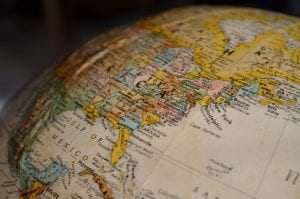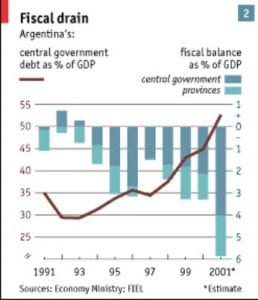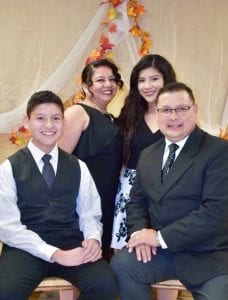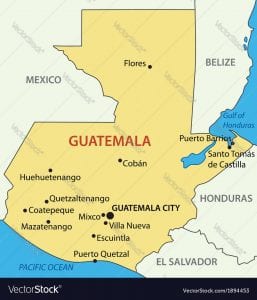Interview with Ling Dong
Interview with Mrs. Ling Dong

Introduction
My partner and I had the privilege of interviewing Ms. Ling Dong for the Immigrant Harrisonburg Project. She is a teaching aid at a local elementary school and is happily married with a beautiful young daughter. No two stories of immigration are the same and hers is a story of falling in love and wanting to see the world outside of her homeland, Sichuan Province, China. After a few emails back and forth about scheduling, Ling graciously invited us to her home to conduct the interview. We felt very welcome as she had tea prepared and an assortment of Chinese candies she encouraged us to try.
Ling first came to the United States in 2008 and stayed in Lancaster, Pennsylvania for one year. She was doing mission work and after that year was over she moved back to China. Her immigration story starts in January of 2013 however, when she moved to Harrisonburg and has stayed here ever since. Ling met her American husband in China where he too was doing mission work. They fell in love and she decided to move back to the states with him and start a family close to his family that lived here in America.
Connections to China
Throughout the interview she expressed how important family is to her and that family connections are more valuable than anything else. Her and her husband and daughter visit China every summer for about a month to see Ling’s family and when asked about the expenses of making that trip every year, she replied, “…I think for many families they don’t have the fortune to do this. We, I mean we don’t have that much money to do this but we prioritize…we have to cut some other costs…to make sure we can go back.” This summer for the next 3 to 5 years, her and her family are moving back to China so their daughter, Ella, can have a chance to grow up close to both sets of grandparents and it won’t be a 24+ hour flight for Ling to see her parents. Talking about the move, she says, “…[the] older I grow, the more I realize…family is, is very important and that…would be one thing on my bucket list. So…we’re going to do it sooner rather than later.” For as much as she misses her family, we were curious about why they had never come to visit her. She told us, “unfortunately, my family did not pass the visa interview and that was a lot of work and it cost money to do that…so for my mom as a traditional Chinese woman, that was not a pleasant experience for her. So she does not want to try it again.” I have personally never experienced a situation like this one but I can only imagine the discouragement and anger they must have felt after putting in months of work and money only to be denied; I can’t blame her for not wanting to go through that process a second time.
Ling loves and embraces her Chinese culture, “it’s under my skin” she says, “I know I’m Chinese…wherever I will be always be Chinese…” We saw first-hand examples of this throughout the interview, but Ling mentioned that she talks to (and scolds) her daughter in Chinese. She also keeps a Chinese knot in red on her front door and another one hanging in her living room as a reminder of her roots; we learned that it symbolizes happiness and good luck.
Integration into American Culture
Ling had been learning English since middle school so by the time she came to the states reading and writing in English was not a challenge. Listening and speaking, however, proved harder than she anticipated. She recalls, “…speaking slangs or lingos is still difficult for me because those things you don’t get without the language environment…” meaning she essentially could not fully learn the language until being immersed in it. In terms of adapting to Harrisonburg, she said she is “…very impressed with the welcoming atmosphere and also I liked the different culture diversity [and] the groups of people from all over the world. I feel like there’s more new things going on in Harrisonburg.” She also told us how her neighbors and community were welcoming when they first moved in and supportive in times of need. For example, they cooked meals for her and her family when she delivered her daughter.
Ling worked as a middle school teacher in China. She wanted to continue to teach after she moved, but found that the only jobs that were initially available for her were entry-level jobs. She worked at A Bowl of Good preparing food until she became certified as a teaching aide.
Personal Immigration Experience
Before Ling and her husband could even book a ticket from China to the United States she had to start the immigration process and paperwork six months in advance. Fortunately, Ling told us she has not personally felt any “…hostile or unfriendly behavior toward my race or where I come from. So I guess I’m just lucky.”
Immigrating to the US at 35 years old is not a commonality among immigrants. Most move with their families at a young age and build their lives in America. Ling had established a whole life and routine for herself in China before she moved. She told us, “It definitely requires time and patience. I think for younger people, might be easier when you’re younger to when you immigrate at a young age you don’t have family, don’t have other obligations to fulfill. So you could be more focused. At my age, we had not a difficult time but quite stressful to just get back on track, you know. [I never] wanted to work those entry level jobs and I want my career back.”
She says her best piece of advice for someone going through the process of immigration and adapting to a new place is to surround themselves with people that are supportive and empathetic to your struggles.
“I just wish people who in that position dealing with other people’s lives…had more mercy” she says, “To find, to build a strong support system for yourself, to find people that come from the same place you come from, to find people who have similar interest as you. So you, you need, you need to have a circle or several circles…just to have a real life here. Stay away from isolation, really, really, need make friends.”
Other Interesting Findings
My partner and I were very interested in her perception of America and how Americans were portrayed and perceived in other counties such as China. Ling noted that they (we) are portrayed as “much bigger” and “violent”, both of which are accurate. She also talked about the difference between the school systems in American vs. in China. She said the educational philosophy is different between the two countries; Chinese education focuses on the learning and mastering the materials and learning goals while the American school system is all about ‘trying your best is all that matters’.
Another difference between the two cultures is the level of respect that is expected. She said they have much more table manners, and respecting seniors and people who are older than you is “a big thing”. Regardless of whether or not there is a familial relationship between the two people, in China you would address an elder as “Older Sister (their name)” or “Older Brother (their name)”, for example in China I would address Ling as Older Sister Ling even though we have only ever met once for this interview project. The aspect of respect in the Chinese culture carries into the school system as well; Ling recalled students get away with a lot more disrespect and have much more freedom to choose what they will and will not do in school here than they would in China.
Connections to Class
Throughout this interview, some of the answers and topics Ling talked to us about were similar to those we have discussed in class. One example is that most immigrants come to the US already having a set network or some connections for work before they move. Ling had nothing. She knew her husband and that was good enough for her. She had no idea what she was going to do for work, had no friends or family here, and did not know what her life would be like when she got here. As she mentioned before, she found a circle of friends and people that were in the same or similar situations as her to help her adjust to this new life and she basically created her own network.
Another connection to a topic we had learned about in class is that immigrants often have to prove themselves to be good or innocent, or meeting the standard for legal immigration. Ling said she felt that the immigration system is run on a philosophy of “guilty until proven innocent” or starting from an assumption that a person is ill-natured. She felt that it is almost as if the people that allow immigrants into the country are looking for reasons to deny them a visa or citizenship. She said that she also had to prove herself qualified for teaching in the Unites States even though she had been teaching for several years in China. She had to pay to take certification classes and get more education even though she was just as qualified, if not more so, than current teachers here. This idea reminded me of a presentation that we did on the Chinese Exclusion Act of 1882. Under this act, Chinese women who were trying to immigrate to the US because of work or more commonly because they fell in love with soldiers, were assumed to be prostitutes or women of poor morals. These women had to prove to officials that they were not prostitutes and were assumed to be something they were not solely because they were Chinese.
In Massey’s Why Does Immigration Occur? A Theoretical Synthesis, he talks about all the different theories of immigration, as the title suggests. From the Segmented Labor Theory to the Social Capital Theory, most all of them discuss the reason for immigration being political unrest, economic opportunities, or variations of those two. Ling’s reasons were her own personal ones: wanting to be with her husband and wanting to travel while she was still young and able-bodied. The only theory that I could see relating to her immigration story would be Cumulative Causation Theory. This theory states that “over time international migration tends to sustain itself in ways that make additional movement progressively more likely”. It could potentially be relevant if her family or friends from China see the life she has made for herself in America and see how happy and successful she has been and decide to immigrate based on her story.
We also discussed in class how some immigrants either try to completely “Americanize” themselves or totally embrace the culture their home country. Ling is neither one of these extremes as she embraces her Chinese culture while still adapting and adhering to American norms. One thing she did mention that is very “Americanized” about her culture is the food. She says American Chinese food is not the same as Chinese food in China; it is much saltier here and it is adjusted to better cater to the area where the food is being sold.
Conclusion
Being able to participate in Immigrant Harrisonburg has been an amazing experience. I feel so lucky to have been a part of sharing and hearing the unique stories of people’s immigration on a platform that can be reached by anyone. We are so fortunate to be able to live in or go to college a town such as Harrisonburg; ‘The Friendly City’ and a place immigrants from all over can call home. It was a privilege to meet with and interview Older Sister Ling and I sincerely hope people take the time to read the Immigrant Harrisonburg interviews and learn about the cultural differences Harrisonburg has to offer.
[00:03] Trenton Heard: I’m Trenton Heard
[00:05] Claire Keeton: Um, this is for our sociology 318 class and today we’re here with Ms. Ling Dong, thank you again for taking time out of your busy schedule to help us with this project. We really really appreciate it for the second time. Um, could you just start off by telling us your full name, age, and where you are from?
[00:23] Ling Dong: My full name is Ling Dong and I’m originally from China. My age, I just turned forty.
[00:33] Trenton Heard: And what part of China are you from?
[00:35] Ling Dong: It’s called, why am I looking at it? (looks at microphone) It’s called the Sichuan province and its kind of in the central in China, geographically.
[00:46] Claire Keeton: Um, what year did you come to the U.S. and how old were you at the time?
[00:52] Ling Dong: Um, I came to the U.S. in 2008 for the first time. I stayed for a year in Pennsylvania. The recent time was from 2012, no no no January 2013 till now. I stayed in, yeah Harrisonburg.
[1:13] Claire Keeton: And how old were you at that time?
[1:15] Ling Dong: That was 2013, so five years younger than 35.
[1:21] Trenton Heard: So when like coming to America, um what were some of the struggles you had to go through with regards of getting actually to the states?
[1:30] Ling Dong: Um, you mean through the immigration process?
[1:34] Trenton Heard: Yes, Exactly
[1:35] Ling Dong: So when I was in China, um my husband and I, we had, we had, to start my immigrant immigration process half year before, before the time that yeah we book ticket to come over here. So that took over half a year to just get all the paperwork done and enabled me to come over from that’s the China side happened. Yeah
[2:05] Trenton Heard: And did you meet your husband in China or did you meet him in the states?
[2:08] Ling Dong: I met him in China.
[2:11] Claire Keeton: Um, that kinda answers the question but was it a personal decision for you to come to the U.S. or did someone, I’m assuming your husband um or something influence this move?
[2:22] Ling Dong: Um, it is ahh, it is a personal decision and also it involved my husband’s input to make that actually happen. Yeah, traveling the world always a dream for younger me back then. And I had traveled to other countries overseas before I came to the states. So that, that seems to be a right timing for me to come over.
[2:55] Trenton Heard: So like what was your biggest concern about coming to the states? Was it like leaving your family, not knowing how to speak english or learning a new language or what was your biggest concern?
[3:07] Ling Dong: It includes all those aspects, be away from family for long time oh yeah was a concern. Um, because I had very close relationship with my family. Also the language I didn’t, uh, I did not worry about language too much but um, it was there cause, you know, language is the main way of communication and even in a different culture that requires a lot of communication.
[3:37] Trenton Heard: And how familiar were you with English speaking language? Did you speak any English while you were in China or did you have to learn that on the fly?
[3:45] Ling Dong: Um, for me, I um, well overall in China on kids have to take English class back to my time was from middle school and for today’s kids they start even early. Yeah to learn english. So before I came, I had some, I had some good vocabulary back then um, the one thing I really have to work on was um, actual talking, speaking. Yeah using that language as a way to verbally communicate with people. So I was pretty good at um, read and write, but the listening and speaking part I had to, I realized later that was harder.
[4:35] Trenton Heard: Now I know like when people learn like another language, everythings is really proper. Um like just like America has a like a lot of slang, a lot of like different ways of people saying things. Um how hard was it for you to learn like the different slangs or the different like I guess like lingos that people say you know depending on where you live too.
[4:54] Ling Dong: Oh, speaking slangs or lingos is still difficult for me cause those things you don’t get without the language environment, without, I mean outside of that, that culture. So I did not know, I did not know much of the slangs before I came and I could not understand what people mean when they use imply those in their, in their, uh talking. Yeah so that I think that’s a challenge for me as uh, yeah as a second or no, uh as someone who speaks english as second language.
[5:31] Claire Keeton: Um, and you mentioned that Pennsylvania was the first place you moved to, what brought you to Harrisonburg?
[5:39] Ling Dong: Harrisonburg, So, um, well my husband he found a job in Harrisonburg. So that’s why we came here.
[5:53] Trenton Heard: And do you like Harrisonburg, do you think it’s pretty culturally diverse here? How do you like living in a place like Harrisonburg?
[6:01] Ling Dong: Oh, I didn’t know much about Harrisonburg before I came. I just gradually, um, I am very impressed with the welcoming atmosphere and also I liked the part of diversity in yeah, just the different culture diversity also the groups of people from all over the world. Um, yeah that’s just has been a learning experience for me to, yeah living here comparing the one year I lived in Pennsylvania. I feel like there’s more new things going on in Harrisonburg
[6:37] Claire Keeton: So Harrisonburg calls themselves like the friendly city. Did you find than it was in Harrisonburg or in in Pennsylvania or just different?
[6:46] Ling Dong: Umm, I guess here. So I didn’t have, I didn’t have, um okay, I guess i’ll put it this way. I have better, a bigger circle of friends or acquaintance here in Harrisonburg because I had more opportunities to meet people and also more opportunities to be exposed to different cultures like hispanic culture and also arabic culture, but I didn’t have those opportunities while I was in Langster Pennsylvania. Yeah, I agree. It is quite friendly. The neighbors came to say hi to use the first or second day we move here. Um, yeah communities been very supportive and especially when the times in need, they cook meals for us when I delivered my daughter and yeah people brought meals too.
[7:46] Trenton Heard: So I guess that question i’m about to ask you, It should I guess be a positive one. So like when you came to Harrisonburg, whether it was Pennsylvania or Harrisonburg, how do you think you were treated as like a an Asian or like a minority because I know there is a lot of black lash between like, you know minorities and the majority because of things that may have happened for example, after 9/11, there were a lot of muslims that were getting, you know, hated upon due to their race and ethnicity because of what somebody else did. Did you feel any of that when you were in Pennsylvania or Harrisonburg?
[8:20] Ling Dong: Yeah many many bad things happened to people from minority, from different background based on their racial differences. Um personally I haven’t encountered any those hostile or unfriendly behavior toward my race or where I come from. So I guess I’m just lucky.
[8:53] Trenton Heard: Now do you face any of those stereotypes? I guess people have put a wrong, like Asians, Asians have, I guess small eyes or Asians are really smart or have you faced any of those stereotypes?
[9:05] Ling Dong: Yeah I head people like talk about those stereotypes like joking way. Um, I don’t see those. Um, so I don’t, I don’t experience with adults but I did hear those stereotypes from my students here in public school. Yeah they would have be brave to come over and ask me those questions like do all asian people you know have this kind of eyes. Yeah, people tend to have those stereotypes such as Asians are good at math. Um, well they work hard, they work lot harder than kids here so. But not everybody, so that’s not true to everyone and yeah, I did get asked those questions.
[9:57] Claire Keeton: I know we last time about how you’re like in the public school system as a teaching aide, was that your first job coming to Harrisonburg or did you do that in Pennsylvania as well?
[10:06] Ling Dong: Um, that’s what I did in Pennsylvania through a volunteer program, but in Harrisonburg, my first job was very entry level. I work at the cafe, so like food service. So I serve and I prepare food and yeah for the customers.
[10:27] Claire Keeton: And where was that?
[10:28] Ling Dong: That was um a bowl of good, if you know. It’s a local restaurant a bowl of good. It’s on Mount clinton pike near EMU. Not far from here.
[10:42] Claire Keeton: Um, Did you feel that as an immigrant, would you have, I’m going to rephrase this question, would you have gone straight into teaching? Do you feel like coming in from a new place if you were not an immigrant do you feel like that had any affect on you having to get like an odd job before you got back into your teaching?
[11:03] Ling Dong: Um, I feel that way. I think that’s true in my case because I was a middle school in China before I came. Um, I see it more as a professional job then those entry level jobs. But um after coming here, I sense there is a gap for me to go straight back to a professional job without any further training or you know, certificates to prove that I am qualified to do those things. So I had to go through the system to you know to have those paperwork to show. Yeah, I so that, that takes time and takes money to go through the training process. I had to go back to school, take classes too, to be able to be where I am at now.
[11:56] Claire Keeton: So even though you were just as qualified, if not more, and were doing essentially the same you felt you had to still prove yourself even though you had a great job in China, in Pennsylvania, is that what?
[12:08] Ling Dong: Yeah I think so. I think here in the states for people to accept you, especially academically, they have to or we as immigrants, we have to show people that we, we know, um, we know what they need and we can provide that. So we have to really prove that for people here before they hire us. I feel that way.
[12:36] Trenton Heard: How hard was it for you to go through that process? I know like going through the immigration process was hard, you know had to do all the paperwork. How hard was it for you to, i’m sorry, Claire said it to prove yourself and get through that system of like proving yourself to become a teacher in America.
[12:52] Ling Dong: How hard that is?
[12:53] Trenton Heard: Mhmm
[12:54] Ling Dong: Um, It definitely requires time and patience. Um I think for younger people, might be easier when you’re younger to when you immigrate at a young age because you don’t have family, don’t have other obligations to fulfill. So you could be more focused. At my age, we had not a difficult time but quite stressful to just get back on track, you know. Um I never, I mean I never, I never wanted to work on those entry level jobs and I want my career back. So yeah, just have to cross those hurdles and to put work into it.
[13:48] Claire Keeton: How often to do you go home to visit family and friends?
[13:55] Ling Dong: We go back almost every summer for about a month to see my family and friends there.
[14:04] Trenton Heard: And I know like going overseas especially China, it’s really expensive, and you know it’s a lot of work and going through that process. Um, is there every a time where you feel like it’s become too much to go back every summer or is there a time where they’ve come over here to visit you?
[14:20] Ling Dong: It is expensive to make that trip. Um, for I think for many families they don’t have the fortune to do this. We, I mean we don’t have that much money to do this but we prioritize so we, we do our best to make it happen so we have to cut some other costs and yeah, to make sure we can go back. It is more expensive.
[14:51] Claire Keeton: I know last time we were here you mentioned that you’re actually permanently moving back. Is there like a reason other than your family that uh, but that’s going to be put in motion soon or is it mainly because you miss your family and you want Ella to grow around them.
[15:09] Ling Dong: Were not moving back permanently, but we are moving back for a certain amount of time like where looking at three or five years to live back, to be with family and yeah, it’s older I grow, the more I realize you know family is is very important and that will be, that would be one thing in my bucket list. So yeah, we’re gonna do it rather than later.
[15:47] Trenton Heard: So coming over to the states, has your family ever wanted to come visit the states or have they ever wanted to see like the big cities like New York or D.C. , like have they ever been interested in coming to do all that stuff?
[15:59] Ling Dong: Um, we did invite my family come over and they showed interest coming over but in reality, the visa is always, always a struggle to to get it, to get that done. So unfortunately my family did not pass the visa interview and that was a lot of work and it cost money to do that. Um so for my mom as a traditional chinese women, and that was not a pleasant experience for her. So she does not want to try it again. Speaking of sightseeing in bigger cities, while China is quite big and some areas that were really developed so I don’t, um, that’s not a big drive for my family to come over. I think it is family is the main reason why why we want to be there or here.
[17:01] Trenton Heard: So like, um, I guess like a big thing is America is the land of the immigrants, you know let all the immigrants in or whatever, but as you said it’s hard to get a visa to come visit the states, even to come for vacation. Um, why do you think it’s easy for americans to get a passport and visit any country they want on vacation but it’s hard for anyone to come visit the United States for vacation?
[17:21] Ling Dong: Well there is a word called privilege. So Americans, if we say it more precisely our American white people, they possess, I don’t know who gave them that power, but the world somehow work that way. They think, I know they are rich, highly educated and also I think in the money. Um yeah, that’s why the countries are competing against each other to, you know, to be rich and they have more, more say, um, as a global stage. I think right now still, U.S. still one of those, one of those who has strong voice internationally. So for Americans, um, yeah they had those diplomacy policies with other countries, so they have those privileges they can just go there without visa.
[18:26] Trenton Heard: Do you think like it’s the citizens of the United States are the reasons why the visas are so strict or do you think it’s more of like regards to the national security. Is the reason why they don’t want to give out that many visas?
[18:38] Ling Dong: Well the immigration process or policies are very restrict and they put that. They say that’s because of security. They want to protect homeland and you know people who live here, they don’t want let any dangerous people come over you know to cause damage here. Um but I personally think it is the nation’s duty job to take care of their citizens, to make sure they’re living life is safe here. And also I disagree on some policies that this country have been carry on because I see they have more restriction on people who are from developing areas, developing countries, or from a different religious background. So I see a system has put people in a place that their not worth trusting. Whoever comes, we have to decide. So it’s not, it’s not , it’s not up to the people who want to come over to this country to prove they are good people or not, it’s up states, up to the government or U.S. government to say you’re good or you’re not good. So like people even have no chance to to defend themselves. So they are sentenced by the government. The U.S. government yeah.
[20:17] Claire Keeton: Something you said last time that I found very interesting was that you feel and not just you honestly I feel the same way but immigrants are “guilty until proven innocent” when the whole thing that Americans like judicial system is innocent until proven guilty. But that was really interesting. You just put that into words because it’s clearly true for months and months of paperwork when you’ve done nothing wrong and you have every right to be here as anyone else. Um not to completely change the subject, but what was your impression of like America, Like what’d you think life in America was going to be like before you ever came? Like before you’d ever seen it for yourself?
[21:02] Ling Dong: Hmm, I guess before you go anywhere, you, it’s hardly need to have the full picture before you had the first hand experience. Um, guess I haven’t thought I would, I would, I would be able to get to know people from, you know, middle east that far or get to know people from Africa or get to appreciate the American culture and African culture here. Um, so those experiences happened after I came so before I came, I couldn’t imagine this. I think the U.S. , the country is more diverse than I used to know and also the life here, I used to think you know (Side conversation with Husband and Daughter) Um I didn’t realize how, how big the race issue. Yeah before I came. And also the gender issue. So yeah in China maybe people never talk about it and it seems like nothing like what’s happening here.
[22:41] Trenton Heard: So how do they portray, I guess Americans in America in China because I know like a lot of Americans now portray China and Chinese people is like oh
[22:52] Claire Keeton: Like on TV shows they’ll be like the really smart one and I’m just wondering if like in America it’s more like we are the fat ones or like the dumb ones, like how it’s portrayed in other countries.
[23:01] Ling Dong: Definitely the size is much bigger. Um, um, poverty and I has was, I just suddenly forgot Americans. Mm, Oh violent. Then the state so the country is not safe because everybody bear arms so it’s not safe. Um, so also maybe due to the government influence, people tend to think that there’s two countries or governments are not friendly with other.
[23:47] Claire Keeton: The American Government?
[23:49] Ling Dong: Yeah, Yeah, the two countries always in competition. Um, because the history that chinese people always and the government always wanting the chinese people to know about the history and how badly the chinese people were treated by you know, the western countries. And um, so there’s not a very, I personally want to say, not very friendly view toward U.S. government. Um, but since the exchange has been that you know the people who are not americans, you know, work and live in China and make China their home there. Um, so people see the both sides, the friendliest of American people but also the aggressiveness in America.
[24:43] Claire Keeton: It’s not incorrect, like there is so much gun violence here and it’s so significantly greater than anywhere else that it would make sense to have that in like other people’s perception of America.
[24:56] Ling Dong: So my mom over phone, my mom would ask me, oh I heard this on news you know, the shooting of school or people got shot and so how’s, how’s the place you are living? And I said, oh, this is a safe place. We don’t even lock the door, you know, let’s say um, so cause people not interesting to, to see the whole picture. I guess the same would happen to American people how they view China or Chinese, yeah they probably know there’s no way to find out the whole story, but people will take those pieces because media approaches or emphasis on those things.
[25:35] Trenton Heard: And is how that they portray Americans in like China? Is like Americans being or Americans and or America being like the violent country that has a bunch of like shootings, killings, and stuff like that. Is that how America is portrayed in China?
[25:51] Ling Dong: Yeah the violence is definitely one thing and also while people admire how well the nature reserve, like the national parks, you know, the work that government has done to protect nature. So people are aware of that too. So there’s a beautiful country with violent and racial problems there.
[26:16] Trenton Heard: Now working, we understand that you work in a school. So kinda going back off the same question I asked you before, are you ever like, what are your views on like the whole bear arm thing and able to defend yourself for like kind of connecting that to like school shootings and stuff like that. What’s kinda your stance on that?
[26:39] Ling Dong: Oh well I definitely support gun control or completely ban gun purchase. I mean if you talk about self defense, well if you have a gun it’s not self defense, that’s killing. Because yeah, there’s no either you die or the other person dies, so it’s life or death. Um, and also you know for people who do not carry guns or people who do not believe in that kind of self-defense, then they put themselves in a vulnerable place like students in schools. (Talks to her daughter) [27:31] Um yeah, I just don’t see why I know Um before the constitute founded or founding fathers, they put that in there too you know, to prevent, like dictator or government like or slave people so they have the arms to fight back for democracy and the rights. But now people are not using guns for those purposes, so.
[27:59] Claire Keeton: This is much less controversial, how have you incorporated your chinese culture into your home and lifestyle here in Harrisonburg?
[28:17] Ling Dong: Chinese culture is a, I realize it’s um, yeah under my skin. I know I’m chinese. The manner where, I mean yeah, wherever I will be always be chinese and also I have adapted to a new environment and I see myself um, has grown into a person who has extended capacity to embrace or difference in countries. So in this house, we cook chinese food and we appreciate mexican food so we have a diversity of foods. Um yeah, we use, we keep our language. I speak to my daughter in chinese, I scold her in chinese (Side comments) [29:26] Um, yeah, we celebrate chinese holidays here.
[29:35] Claire Keeton: So have you brought any like, what’s the word, like decor into your home that’s like traditional chinese, like do you have any like flags or like pieces or anything that um just when you see it, it’s just a little piece of home
[29:51] Ling Dong: Um for instance, that China knot in red, that’s one of the symbol, you know, for, for happiness, for good luck. Um, yeah we do not keep national flag, that’s a different, it’s very different from American, you like to fly your flag, in front of your house people do that, but in China, flag is more like government thing, we do not yeah, we don’t fly a flag around the house, but we keep some small traditions and chinese people would get together for some special occasions. Did that answer that question? I kinda get distracted.
[30:33] Trenton Heard: Yeah that’s funny that you say that cause like I know like America is big on like promoting the flag, you see the flag everywhere. Swim trunks, stickers on back of cars, flags around people’s houses.
[30:42] Claire Keeton: It’s like a decoration, almost like a poster
[30:45] Trenton Heard: So why do you think that’s different in America than like I guess like the Chinese people really don’t promote the flag like Americans promote it here so like the American flags on everything, clothing. So why do you think that’s different? Is it maybe the patriotism or like the patriotism?
[30:59] Ling Dong: Patriotism is everywhere in I mean in all countries they promote that or they try to. China also does they same thing. We just never associate that way, the flag. Yeah it’s interesting and here the flag is everywhere and yeah also maybe the type of governance here is um the election oh we have election there but it’s not the same here so people feel the distance from ruling the country. But here the government is making decisions not as people, but here people maybe feel strongly about, you know, they are involved in the politics, the decision making. They are electing the leaders but there we do not elect leaders so maybe that’s why.
[31:56] Claire Keeton: Um is there something that you like found really weird or funny just like really different about American culture um then you thought it was going to be or like different than like chinese culture, for example, parent, or like the school system or something that you just found funny that we do or like that seems weird?
[32:16] Ling Dong: Um, things people do that here that I think weird (Talks to her daughter)
Weird…Ummm I would not say things are weird, um but they are just different, I haven’t felt like weird or in a weird way.
[32:45] Claire Keeton: Like can you give an example of something that is just like different or just something that you weren’t expecting?
[32:51] Ling Dong: Oh, I can take my work setting as an example. Like the relationship between students and teachers. Um, so here, yeah, here, students are treated (Talks to daughter/husband) Well in China we still spank kids. She’s asking for that. Um yeah, here students, um I know In Harrisonburg a lot of students are from traumatized families, they experienced trauma in their lives, so they’re treated differently but in general, here teachers treat students with is this, you know, they can’t use, I mean, how do I word this? Mmm, so my impression is students can do anything they like at school without consequence. Or the consequence would not be the consequence I’m talking about that you know, would have the students in any sense of fear. I mean I did not mean the negative fear, I mean the respect or honor or the consequences at least they need to remember so next time they don’t do they same thing. But here, they always get away from what they do.
[35:15] Claire Keeton: Like you mean like talking back to the teacher, saying I don’t want to do this. They don’t have a significant enough consequence like respecting their educators.
[35:22] Ling Dong: I think um, yeah that’s one. And also and maybe the educational philosophy is different so the learning goal sit there when students cannot meet it, cannot meet the goals, the teacher would say, well, it’s okay we’ll try that later. Um, but the students never did their best. I mean the could have the potential to meet their goal but they had all kinds of excuses not to make that happen, there’s nothing that teacher could do. Well in China, you know, we say, this is the learning goal for today, you’re going to do your best. So then they need to show their best. Um but if you did not meet your goal by the end of the day for example, like three pages of math, you didn’t get those problems solved, then you might stay at school till we get through this.
[36:16] Claire Keeton: In China, that’s what would happen?
[36:17] Ling Dong: Yeah in China. I could call parents and parents could come over and we could sit there together until you get your work done. So that depends on, so if you really try your best, they can tell right? They know their students they can tell, you tried your best and didn’t make the goal, maybe my goal was too high than your ability so we could lower it. But for some students, they just goof around and didn’t do their work and they are going to stay here till they finish. Or we could call parents and parents is always, in China parents always unconditional cooperative with teachers. So that’s the big difference, so i’m surprised to see there, you know why there that um standard of learning, SOL, why the scores are not as high as some schools. But there is also teachers feel you know, they cannot push students like in China like teachers did. They are afraid of the stress, afraid of you know, that hurts, well hurts because nowadays the suicide rate is high from pressure of stress so afraid of that. And teachers they are tired, they cannot, the academic achievement is not that desirable.
[37:38] Trenton Heard: So the leniency is America is a lot more, I guess greater than it is in China. Kids in elementary school now can like pass with doing like the bare minimum. Cause I know like when I was in elementary school, like as long as you showed up for class and did a little bit, they moved you up to the next grade. So like in China, they make sure you know the stuff before they move you on to the next grade.
[37:59] Ling Dong: That’s right, that’s right. I’m not saying that the way China is doing education is great. I think there is too extreme, like too tight, too much work, kids did not have enough free time. But here, I feel like it’s too loose. Another one, another thing I discovered the difference is parenting. Which I appreciate what I learned from here, I feel like kids at a younger age, they need to learn how to think for themselves. I feel in China, parents kind of did the thinking for their kids which is not good for later on development.
[38:44] Trenton Heard: Now is there like specific customs that you have either adopted like American customs or any Chinese customs brought over to America? My mothers Korean and she’s brought over a lot of Korean customs to our American household. Have you brought any of those over hear or have adopted I guess so called American customs?
[39:03] Ling Dong: Costumes? You mean the way we dress? Any traditions?
[39:07] Trenton Heard: Anything you do for instance, like my mom hates shoes in the house. So before you walk in, shoes are in the cubby and I see you have the cubby over there with shoes. So that’s like a custom my mom’s accounted too. Your shoes are off before you walk around the house.
[39:23] Ling Dong: Yeah shoes off in the house and I guess yeah. I personally appreciate neat, tight, tightness in the house. So i’d rather you know, things to be put away and I often struggle her because she’s opposite. Um yeah, we had more like table manners for say, um well her since that’s not why people you know, when you casual say you don’t really care about table manners or something but there and also respecting to respect the senior people who is older than you. It’s a big thing, you need to always be respectful, especially to people who are older than you, especially seniors. So we do not address people by their names. We always use title.
[40:20] Claire Keeton: Like Mr, Mrs. or Dr or like what do you mean by title?
[40:24] Ling Dong: Um yeah, your title, your work title, If you’re older than me, I need to respect you by calling you older sister Claire, so that way. Um, yeah, Now older people call me would use like younger sister Ling, so you like have that family kind of relationship with people who are not your sole family.
[40:51] Claire Keeton: That kinda answers my next question, so how would I address you?
[40:54] Ling Dong: Yeah you would address me older sister Ling even though we do not have that family tie so that’s yeah, they way you be polite, so the politeness.
[41:04] Claire Keeton: Um, how would your life be different have you not migrated to the U.S. and I know you were a middle school teacher you said in China and you’re still teaching here, um do you still think you would be a teacher in China, maybe a different grade or do you think your life maybe would have chosen a different career path or how do you think it’d be different?
[41:25] Ling Dong: Um, oh thank you for asking this question, Yeah, this is, this is due to a person’s personality and also expectations for life. For me, I always walk on changes and um I like life is full of adventures, at least when I was younger and now probably I would appreciate more stability in life. So if I never immigrated, I might be somewhere else and I see myself as a traveler, as a pilgrim in the world at least, why I still can move my body around and I would like to keep on moving, yeah.
[42:15] Claire Keeton: You said you’re a traveler, do you think you had not lived here, how high up do you think the U.S. would have been on your list of places you wanted to see? Because there’s like way so many other places, in so many other beautiful places around the world. How do you think the U.S. would have ranked on that list?
[42:32] Ling Dong: Um, natural scenery, Um U.S. has quite a few like world level, um, like those national parks. Yellowstone, Grand Canyon, so those places they are worth seeing, um yeah if I couldn’t come here, I might make my trip to other places to appreciate, yeah, the other wonders of the world.
[43:05] Trenton Heard: So I feel like a lot of questions people ask like people from other countries is like how is the food different. For instance, like your in America now and you’re a Chinese women, how is the Chinese food hear different from the Chinese food served in China or how’s the Mexican food here, different from the food in Mexico. Yeah, how is it different and how is it similar?
[43:26] Ling Dong: Um so people ask me the same question before, Chinese culture has you know, has um, that reputation. Travel from away from China, Chinese food here, lots of Chinese restaurants here run by people from south China called Fujian Province. So it’s typically um, Americanized food. The way of cooking is very different from real chinese food. And as for real Chinese food, there could be a whole book written to talk about it real chinese food or regions just like here, like New Orleans has their way of cooking, um Mexico they have their way of cooking. There is a state called New Mexico, so there in China is the same different regions, they have developed their way of cooking their food. Yeah some place favors more spicy, some places favor sour, sweet, so you get very different taste yeah.
[44:43] Trenton Heard: Okay so you’re saying who started these Chinese restaurants, Americanize or kinda develop their recipes to where they are at in the states? So like New Orleans like spicy so they Chinese food down there might be a little more spicy than it was like let’s say Maine, where they kinda like a more, I guess like a tart flavor, is that what’ you’re saying?
[45:04] Claire Keeton: I guess adapt it to where they are setting up their restaurant?
[45:07] Ling Dong: I think so. I think the Chinese restaurants here, they have adapted to American tastes but real Chinese food is very different and I cannot describe, you have to find out.
[45:23] Claire Keeton: Um so finally, I know we have taken up double the amount of time we were supposed to but if you could give yourself a piece of advice knowing what you know now about the immigration process and your life here in the states. What would it be?
[45:39] Ling Dong: Um, advice for the immigration process, I just wish people who in that position dealing with other people’s lives, but they had more mercy there, yeah um, for the second part, advice for my life here. To find, to build a strong support system for yourself, to find people that come from the same place you come from, to find people who have similar interest as you. So you, you need, you need to have a circle or several circles for yeah, just to have a real life here. Stay away from isolation, really, really, needed make friends.
[46:52] Claire Keeton: Well once again, you have been lovely to talk to. Ella, great entertainment as always, Um and we really really appreciate you letting us into your home for the second time and we are again so sorry that you had to do this again. But you’re very interesting to talk to. Thank you.
